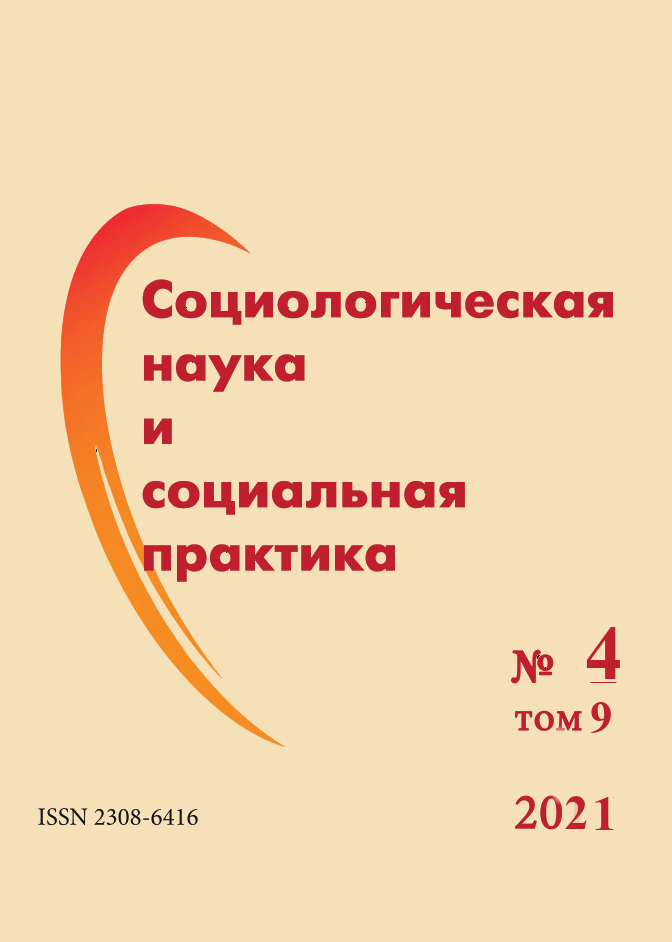Готовность к риску как адаптационный ресурс: субъективные оценки взрослого населения России
Научная статья
Аннотация
Литература
2. Здравомыслов А. Г. Человек и его работа в СССР и после : учебное пособие для вузов. 2-е изд., испр. и доп. / А. Г. Здравомыслов, В. А. Ядов. М. : Аспект Пресс, 2003. 485 с.
3. Козырева П. М. Процессы адаптации и эволюция социального самочувствия россиян на рубеже XX–XXI веков. М. : Центр общечеловеческих ценностей, 2004. 319 с.
4. Козырева П. М., Смирнов А. И. Особенности и тенденции адаптации россиян к изменяющимся условиям в постсоветский период // Россия реформирующаяся : ежегодник / Отв. ред. М. К. Горшков ; Институт социологии РАН. М. : Новый хронограф, 2016. Вып. 14. С. 133–171.
5. Корель Л. В. Социология адаптаций: вопросы теории, методологии и методики / Л. В. Корель. Новосибирск : Наука, 2005. 424 с.
6. Корнилова Т. В. Диагностика мотивации и готовности к риску / Т. В. Корнилова. М. : Институт психологии РАН, 1997. 232 с.
7. Корнилова Т. В. Психология риска и принятия решений : учебное пособие для вузов / Т. В. Корнилова. М. : Аспект Пресс, 2003. 286 с.
8. Корнилова Т. В. Диагностика «личностных факторов» принятия решений // Вопросы психологии. 1994. № 6. С. 99–110.
9. Лукашенко Д. В. Адаптация личности как способность // Человеческий капитал. 2019. № 5 (125). С. 75–78.
10. Мозговая А. В. Социология риска: возможности синтеза теории и эмпирического знания // Риск в социальном пространстве / Под ред. А. В. Мозговой. М. : Изд-во Института социологии РАН, 2001. С. 9–38.
11. Мозговая А. В. Стратегии адаптации к различным типам рисков // Социологическая наука и социальная практика. 2020. Т. 8. № 3. С. 32–46. DOI: 10.19181/snsp.2020.8.3.7485.
12. Мозговая А. В., Шлыкова Е. В. Неравенство в распределении рисков: ресурсы и стратегии адаптации // Россия реформирующаяся : Ежегодник / Отв. ред. М. К. Горшков ; Институт социологии РАН. М. : Новый хронограф, 2016. Вып. 14. С. 358–378.
13. Ростовцева М. В. А. А. Машанов. Основные подходы к исследованию адаптивности личности // Вестник КрасГАУ. 2012. № 7 (70). С. 191–195.
14. Филимонов Д. М. Готовность к риску в контексте преодоления субъектом ситуации неопределённости // Вестник Тверского государственного университета. Серия: Педагогика и психология. 2016. № 3. С. 244–248.
15. Ядов В. А. Социальный ресурс индивидов и групп как их капитал: возможность применения универсальной методологии исследования реального расслоения в российском обществе // Кто и куда стремится вести Россию? Акторы макро-, мезо- и микроуровней современного трансформационного процесса / Под общ. ред. Т. И. Заславской. М. : МВШСЭН, 2001. С. 310–319.
Поступила: 06.09.2021
Опубликована: 02.12.2021








 Издатель: Федеральное государственное бюджетное учреждение науки
Издатель: Федеральное государственное бюджетное учреждение науки